This article was co-authored by Francisco Gomez. Francisco Gomez is the Head Coach at the FIT Potato Gym, a training gym established in 2001 in the San Francisco Bay Area. Francisco is a former competitive runner who helps endurance athletes train for major marathons like the Boston Marathon. Francisco specializes in Injury Rehab, Flexibility, Marathon Training, and Senior Fitness. He has a B.S. in Nutrition and Exercise Physiology & Running.
There are 16 references cited in this article, which can be found at the bottom of the page.
This article has been viewed 24,042 times.
Getting enough energy and motivation to work out can be difficult. Long work schedules, long commutes and busy lives don't make it any easier. In addition, our busy and stressful lifestyles may make us feel run-down and fatigued, which can make it more difficult to stay on schedule with exercise.[1] However, there are some things you can do to decrease your overall fatigue that may help you work out a bit easier.
Steps
Reducing Fatigue and Increasing Energy
-
1Drink enough water. One of the number one causes of fatigue and drowsiness is dehydration. Even mild dehydration, which may include up to 75% of the population, can cause you to feel tired.[2]
- The minimum amount of fluids you should drink daily is about eight glasses, or 64 oz; however, most health professionals are now saying to drink between 10–13 glasses of fluid daily. This amount will increase with your physical activity level.[3]
- Keep a water bottle handy. This will help you stay on track with sipping all day long and can help you see how much more you need to drink.
- Stick with no-calorie, hydrating fluids like water, flavored water (add some herbs or fruit), and unsweetened decaf coffee and tea.
-
2Have a pre- or post-workout snack. In addition to water, your body is fueled by food. If you do not eat to fuel a workout or to recover from one, your performance and stamina can suffer.
- You need a little fuel or energy to get your body through a workout. Without a pre-workout snack, it's like trying to drive a car on an empty tank. Go for carbohydrates like a piece of fruit, a small bowl of oatmeal or yogurt. A small meal or snack that has simple carbs can provide your body with enough energy to get through the workout. Without one, your performance and stamina will suffer and you will see fewer or slower results long-term.[4]
- Carbs combined with protein are the best choice after you exercise to help resupply the energy you used and provide the protein to help rebuild muscle.[5] Try fruit with yogurt/cottage cheese, a glass of skim milk, or a smear of peanut butter on a piece of whole wheat bread.
Advertisement -
3Watch your calories. In addition to your pre-workout snack, it's also important to consider your entire diet. If you're trying to lose weight but are feeling tired all the time and have little energy to exercise, your total calorie intake may be too low.
- Many diets, cleanses, and fad diets usually suggest eating very low amounts of calories. When you do not eat enough food, your body can't get enough nutrition to function at its optimal level, with fatigue being one of many side effects.
- In addition, if you're regularly working out, you may need more calories to help support that activity.
- Try not to cut out calories so that your total level goes below 1,200 daily. This is typically recommended as the absolute minimum.
-
4Eat a balanced diet. A balanced diet is important for overall health, but will also supply your body with all the essential nutrients it needs to function. When your diet is not balanced, you may suffer from fatigue and other side effects.[6]
- A balanced diet is one that includes foods from each food group most days. In addition, it's a diet that includes a wide variety of foods from within each individual food group over the course of a week.[7]
- Some diets and dieting patterns suggest avoiding large quantities of foods or entire food groups. Low-carb diets for example may want you to avoid grains, starchy vegetables, dairy foods and fruits. A common side effect of low-carb diets is fatigue.[8]
- Ask your doctor about getting your iron checked. Low iron levels in the body can have a major impact on your energy levels. If your doctor finds you have low iron levels, you can discuss getting more iron through diet or supplements.
-
5Get enough sleep. If you're feeling fatigued, obviously getting enough sleep should be high on your list. Without adequate sleep it may be hard to find the energy and motivation to work out.
- Without adequate sleep you may notice you're more tired. In addition, chronic lack of sleep can put you at increased risk for a whole host of health problems.[9]
- It's typically recommended adults get around seven to nine hours of sleep each night.[10] Try going to bed earlier and sleeping later if you can.
-
6Manage stress. Too much stress or long periods of chronic stress can wreak havoc on your life. Being fatigued and tired is just one of many symptoms that are associated with too much stress.[11]
- Although exercise is thought to help relieve and help manage stress, it can become a vicious cycle when you're too tired to exercise and can't get a hold on your daily stresses.
- If you can't fit in your usual workout, try other stress relieving activities like talking to a friend or family member, meditating, taking a hot shower, going to bed earlier or reading a good book.
- If you find that stress is the number one cause of your fatigue and you're having difficulty managing it, consider speaking to a therapist for additional techniques.
Sticking to Exercise When You're Fatigued
-
1Schedule in your exercise. Many times it may be difficult to find the time to fit a workout into your busy schedule. But studies have shown if you take a step back and start scheduling in your workouts like you would a doctor's appointment, you might have better success.[12]
- Take some free time on your days off and review your upcoming schedule for the week. Look for slots within some of your days (it can be three to five days a week) that you could fit in some exercise. It can be an hour of time or something as short as 10–15 minutes.
- Write your workout in your weekly calendar or datebook, or program it into your phone as a reminder.
-
2Write down your exercise motivations. Keep yourself motivated to work out when you're feeling tired by focusing on the benefits of exercise. Studies have shown that this may help you follow through with your workouts.[13]
- Before you can visualize, spend some time writing down the benefits you get from being active. You might write about being able to maintain your weight or lose weight, feeling more energetic during the day, feeling more fit and healthy, or feeling strong and confident.
- You can also choose to think about all the health benefits of physical activity, like decreased risk of high blood pressure or diabetes, better control of blood sugar and blood pressure, improved circulation and better sleep patterns and mood.[14]
- If you're not feeling up for a workout, spend a few minutes visualizing how you'll feel, how it'll feel doing the exercise, how you'll feel immediately afterwards and long-term. Imagine yourself powering through your workout, feeling positive and confident in yourself, feeling proud of yourself and reaching long-term goals.
-
3Go for a short workout. It's recommended to get in about 150 minutes of cardio a week. Although that seems like a long time, it works out to 30 minutes five days a week, and there is no guideline that says it can't be done in short intervals throughout the day.[15]
- If you're not up for a full- on workout or are too tired to hit the gym, do a short 10-minute activity. It still counts as exercise and the benefits are almost identical to those people who did longer bouts of exercise.
- Don't get frustrated or upset with yourself if you're not in the mood to work out. Try a 10-minute walk, restorative and relaxing yoga or a few isometric exercises (like planks).
- Another strategy is to present yourself with small opportunities to get some activity in your life. For instance, get off the bus a few stops early and walk the rest of the way or skip the elevator in the morning and take the stairs. Commit yourself to do one thing like this each day.
-
4Do something fun. If you're tired and you do not particularly enjoy the exercise you're supposed to be doing, there's probably little chance you'll follow through. Choose fun and exciting forms of exercise to help motivate you.[16]
- If going to the gym is not your thing or you find running miserable, you're less likely to continue exercising. Find something you truly enjoy that also counts as physical activity.
- Try something outside the box, like hiking, kayaking, swimming, taking dance lessons or playing a team sport.
- Also try working out with a friend or in a group setting. This can make it more fun if you have someone to socialize with as well.[17]
-
5Ensure you're using correct form. If you're not using correct form for exercises you're at increased risk for injury, but you may also be tiring yourself out.[18]
- When you're not using correct form or even using too much weight, your body spends more energy and calories. This can create fatigue in the short and long-term.
- If you do exercises, especially strength exercises, try performing the exercises in front of a mirror so you can see what you're body is doing and what form you're using.
- Make sure not to do strength training on the same muscle group two days in a row. For example, do not do leg strengthening exercises on Monday and Tuesday. This can create muscle fatigue and doesn't help build strength over time.[19]
- Also consider making an appointment with a personal trainer or a staff member at your local gym. They may be able to guide you more closely on how to do certain exercises or use equipment and help you find exercises you really enjoy to help you feel motivated.
Expert Q&A
Did you know you can get expert answers for this article?
Unlock expert answers by supporting wikiHow
-
QuestionHow can I get less tired when I exercise?
 Francisco GomezFrancisco Gomez is the Head Coach at the FIT Potato Gym, a training gym established in 2001 in the San Francisco Bay Area. Francisco is a former competitive runner who helps endurance athletes train for major marathons like the Boston Marathon. Francisco specializes in Injury Rehab, Flexibility, Marathon Training, and Senior Fitness. He has a B.S. in Nutrition and Exercise Physiology & Running.
Francisco GomezFrancisco Gomez is the Head Coach at the FIT Potato Gym, a training gym established in 2001 in the San Francisco Bay Area. Francisco is a former competitive runner who helps endurance athletes train for major marathons like the Boston Marathon. Francisco specializes in Injury Rehab, Flexibility, Marathon Training, and Senior Fitness. He has a B.S. in Nutrition and Exercise Physiology & Running.
Fitness Coach
-
QuestionIs it OK to workout when you are tired?
 Francisco GomezFrancisco Gomez is the Head Coach at the FIT Potato Gym, a training gym established in 2001 in the San Francisco Bay Area. Francisco is a former competitive runner who helps endurance athletes train for major marathons like the Boston Marathon. Francisco specializes in Injury Rehab, Flexibility, Marathon Training, and Senior Fitness. He has a B.S. in Nutrition and Exercise Physiology & Running.
Francisco GomezFrancisco Gomez is the Head Coach at the FIT Potato Gym, a training gym established in 2001 in the San Francisco Bay Area. Francisco is a former competitive runner who helps endurance athletes train for major marathons like the Boston Marathon. Francisco specializes in Injury Rehab, Flexibility, Marathon Training, and Senior Fitness. He has a B.S. in Nutrition and Exercise Physiology & Running.
Fitness Coach
-
QuestionHow can I stop being sore after working out?
 Michele DolanMichele Dolan is a BCRPA certified Personal Trainer in British Columbia. She has been a personal trainer and fitness instructor since 2002.
Michele DolanMichele Dolan is a BCRPA certified Personal Trainer in British Columbia. She has been a personal trainer and fitness instructor since 2002.
Certified Fitness Trainer
References
- ↑ https://www.healthxchange.sg/fitness-exercise/exercise-tips/five-barriers-exercise-singaporeans-time-family-more
- ↑ Francisco Gomez. Competitive Runner. Expert Interview. 24 October 2019.
- ↑ http://www.mayoclinic.org/healthy-lifestyle/nutrition-and-healthy-eating/in-depth/water/art-20044256
- ↑ http://www.bodybuilding.com/fun/4_steps_pre_workout_nutrition.htm
- ↑ http://www.jissn.com/content/9/1/54
- ↑ Francisco Gomez. Competitive Runner. Expert Interview. 24 October 2019.
- ↑ http://www.nhs.uk/chq/Pages/1127.aspx?CategoryID=51
- ↑ https://www.ncbi.nlm.nih.gov/pmc/articles/PMC7231033/
- ↑ http://healthysleep.med.harvard.edu/healthy/matters/consequences
- ↑ https://www.cdc.gov/sleep/about_sleep/how_much_sleep.html
- ↑ https://www.betterhealth.vic.gov.au/health/conditionsandtreatments/fatigue
- ↑ Francisco Gomez. Competitive Runner. Expert Interview. 24 October 2019.
- ↑ http://www.ncbi.nlm.nih.gov/pubmed/18076239
- ↑ http://www.cdc.gov/physicalactivity/basics/pa-health/
- ↑ Francisco Gomez. Competitive Runner. Expert Interview. 24 October 2019.
- ↑ https://www.betterhealth.vic.gov.au/health/healthyliving/physical-activity-choosing-the-one-for-you
- ↑ http://www.healthywomen.org/content/article/get-motivated-workout-you-wont-cancel
- ↑ https://www.hss.edu/conditions_avoiding-muscle-fatigue-exercising-tips.asp
- ↑ http://www.bodybuilding.com/fun/behar2.htm











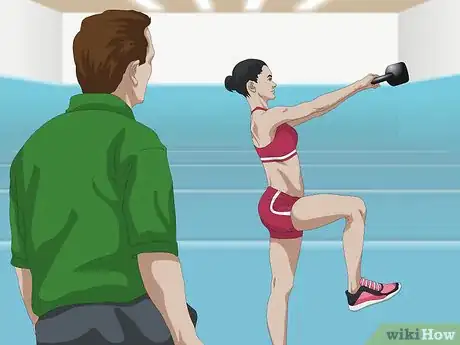



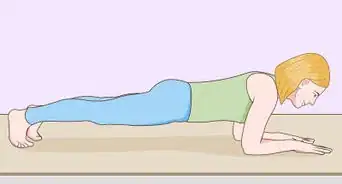


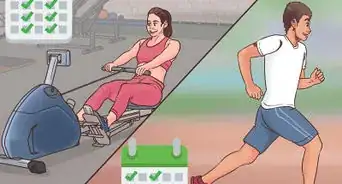
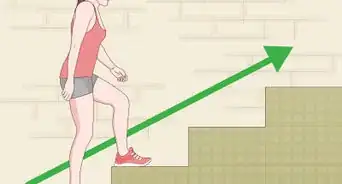

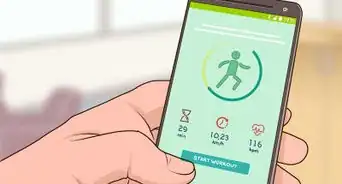
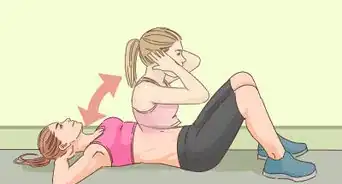









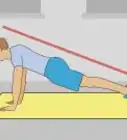




































Medical Disclaimer
The content of this article is not intended to be a substitute for professional medical advice, examination, diagnosis, or treatment. You should always contact your doctor or other qualified healthcare professional before starting, changing, or stopping any kind of health treatment.
Read More...